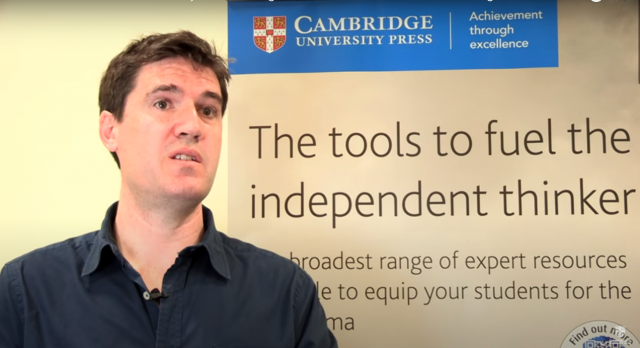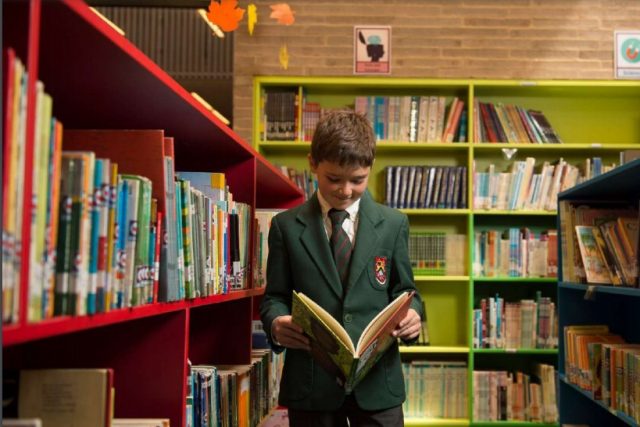Michael Dunn is the creator of theoryofknowledge.net, the world’s biggest site for TOK, and critivicate.com, offering a ‘4C’ course for non-IB schools, from 1st May.
Falling into international teaching
I never intended to live abroad, or become an international teacher. Actually, It’s a career path that few people seem to plan: most of my colleagues arrived where they are accidentally. But whilst they may have fallen into this world, none of them seem willing to climb out of it, and give up the opportunities it gives you.
I’m not going to discuss the kind of life you can lead as an international teacher, the incredible places you can visit, the fantastic people you’ll meet, the sense you’ll have, always, of being on an adventure. Instead, I want to think about how – for me, at least – moving abroad can transform you from being a reluctant teacher to being an enthusiastic one, and by embracing the international mindset that comes with it you can become a much more accomplished educator.

As a teacher in London, I always felt that what I was doing was incomplete. I loved my subjects, I enjoyed supporting my students, I had good friends amongst the staff. But as I taught aspects of world history, compared the political structure of the UK with other countries, and drew on the ideas of thinkers and writers from different cultural backgrounds, I became aware of the narrowness of my own life experiences, and increasingly felt a need to widen my mental horizons.
At that time there was really only one place to look for teaching jobs in the UK and abroad. Teacher Horizons, and the whole online recruitment industry, was still nowhere in sight; instead, teachers in staff rooms all over the country fought over the print edition of the TES every Friday, trying to be the first to the jobs section. My success in this endeavour one week resulted in an interview for a position in Colombia, and a few short months later, I was on an Avianca flight from London Heathrow, to El Dorado International, Bogota.

Four things I learned from ‘going international’
My first posting taught me some big lessons about life and work, and how gaining an international perspective can make you much better at your job. These lessons also propelled me along a path that would lead to me becoming a theory of knowledge teacher, and setting up my website, theoryofknowledge.net.
1. There is a dissonance between perceived and actual realities
At the time I left for Colombia, the country’s main claim to fame was supplying the gun-toting villains for the bulk of Hollywood action films. When I told a (distant) family member where I was going, they said, “That’s where the drugs come from, isn’t it?” Foreign office travel advice wasn’t much better, and there were few people with first-hand knowledge able to correct these prejudices.
But even in 2001, when there was still a serious conflict raging in Colombia, day-to-day life in the capital had absolutely nothing in common with these assumptions and portrayals. The city is stunning, progressive, and fascinating; the people are sophisticated, warm, and welcoming. Colombia is a powerhouse in terms of music, fashion, art, and literature, something you see in its many impressive museums and art galleries and bookshops. And the bars, restaurants, and clubs kept us busy every weekend.
Explore sample resources from theoryofknowledge.net on topics such as “the post-truth landscape” and “the necessity of humility”
In other words, this was a totally different reality than the one I had read about and seen before I moved to the country. Virtually nothing aligned with what I had been told; it was simply a different country. I developed an acute sympathy with the Colombian people who are forced to put up with these incredibly derogatory views of their wonderful country, and I learned that our perceptions of places and people are often based on very shaky foundations. It has made me determined never to rush to judgement about things that I haven’t experienced myself.
2. You learn as much from your students as they do from you
From my very first class in Colombia, although it was quickly apparent that the students were receptive, polite, and keen to learn, I had to recalibrate my cultural references, my sense of humour, my language settings, and other modes of interaction. Jokes didn’t work, anecdotes met blank faces, metaphors confused rather than clarified.
As I relearned the way to effectively communicate with my students – much as one does when one first trains to become a teacher – I learned a new perspective to life. I became familiar with the Colombian outlook on life, the way their Castillano differs from other Hispanic nations, what characterizes their psyche and character. I grew to admire many of their attributes, and, I hope, adopted some of the best of them.

3. By escaping your own echo chamber, you become a true educator
Although you can never escape your own cultural paradigm, you can learn its limitations. I moved to Colombia very much as an English person, proud of my background, and, I’ll admit it, unconsciously biased about its status in the world. And although there’s no doubt that ‘Britain’ is a global brand, with my nation’s cultural achievements recognized and appreciated by many people (I remember one Colombian, in a very off-the-beaten-track bar, saying to me: “Ah, British. The Beatles. Princess Diana. Football hooligans.”), you also learn that there are many global brands.
“As a teacher in London, I always felt that what I was doing was incomplete.”
Not only did I learn about Colombian culture, I also learned about how many other countries exert their influence around the world.

Obviously the most palpable links were with Spain – their architecture was everywhere, particularly in the marvellous downtown neighbourhoods. But then there was the funicular running up Monserrate, built by the Swiss. There were all the German cars (at one point, everyone in Latin America, it seems, drove a Beetle). There were the Australian and Israeli tourists everywhere. The Alliance Francaise is found in even the tiniest towns in Colombia. And I haven’t even mentioned the United States, and the way in which their culture infiltrates, influences, and inspires so many aspects of life in Latin America.
That my country was merely one of many that exerts an influence on the rest of the world made me much more humble, and also cognizant of the diverse nature of the world. By viewing the world through our own national lens, we inflate our own self-importance, and diminish that of others. Living abroad resets the balance.

4. ‘International’ is a mindset – and goes with you wherever you are
I’m now back in the UK, but I feel like I exist very much in an international reality. Of course, it helps being married to someone from another country (another plus of moving abroad!), but even if I hadn’t hooked up with someone ‘foreign’, I know I’d still feel like this.
Being international informs everything I do, from my political alignment, to the way I interpret the news; from the books I read and esteem, to the team I root for in sporting competitions; from the friendships I form, to the way I bring up my children. And, of course, it informs the way I teach. I hope I have managed to suppress my unconscious national biases, and take a more global view of issues, ideas, and thinkers.
I’m lucky in that I’m a theory of knowledge educator, so the curriculum I deal with is not driven by any governmental agenda, or nationalistic slant, or cultural favouristism. I have a great deal of freedom in choosing the thinkers that my students explore, and the central concepts that we build our learning on, and I’m privileged in being able to make these as diverse as possible (although I’m always looking for ways to go further in this area).
The takeaway: there’s no such thing as ‘foreign’

Taking that job in Bogota nearly 20 years ago was the best decision I ever made, and has completely defined the life I now lead. Although I’m never keen to impart advice, I always recommend to others that they should live in as many worlds as possible, and be as international as they can. I’ve mentioned four lessons above that I learned being a teacher abroad, but they can be summarized by this: moving to another country makes you learn that there is no such thing as ‘foreign’. There’s nothing more important for a teacher to embrace than that.



